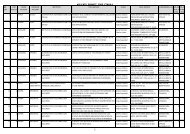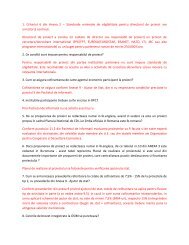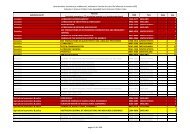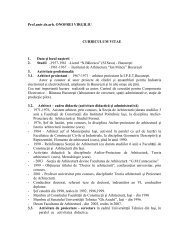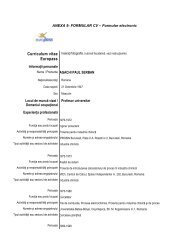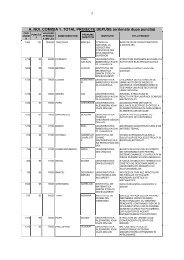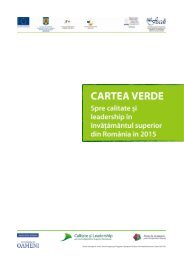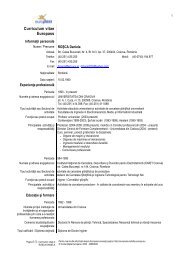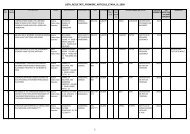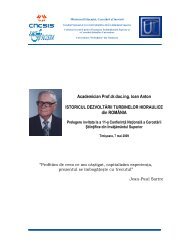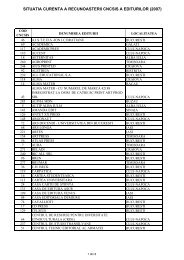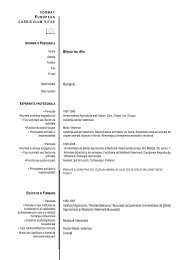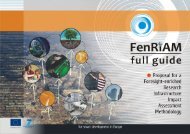Povesti de succes - uefiscdi
Povesti de succes - uefiscdi
Povesti de succes - uefiscdi
You also want an ePaper? Increase the reach of your titles
YUMPU automatically turns print PDFs into web optimized ePapers that Google loves.
În domeniul multi şi interdisciplinar al ecologiei ecosistemice<br />
şi organizării spaţio-temporale, ierarhice a naturii<br />
şi/sau mediului, preocupările ştiinţifice, din perioada 1980/<br />
2000, s-au diversificat şi concentrat asupra: i) <strong>de</strong>zvoltării şi<br />
aplicării teoriei ecosistemice privind mediul/ natura; ii)<br />
i<strong>de</strong>ntificării şi evaluării eco-regiunilor distribuite pe teritoriul<br />
naţional; iii) dinamicii compoziţiei, configuraţiei structurale<br />
şi funcţiilor ecosistemelor şi complexelor <strong>de</strong><br />
ecosisteme, la scara sistemului <strong>de</strong> zone ume<strong>de</strong> al Dunării Inferioare<br />
(SZUDI) şi bazinului hidrografic al acestuia<br />
(BHDI); iv) fundamentării ştiinţifice a rolului diversităţii biologice<br />
în funcţionarea ecosistemelor şi complexelor <strong>de</strong> ecosisteme;<br />
v) estimării categoriilor şi <strong>de</strong>nsităţii fluxurilor <strong>de</strong><br />
servicii – producţie, reglare, suport şi informaţionale; vi)<br />
i<strong>de</strong>ntificării şi estimării factorilor <strong>de</strong> comandă şi presiune şi<br />
vii) fundamentării teoretice şi testării managementului ecosistemic<br />
(integrat) şi adaptativ a ecosistemelor şi complexelor<br />
<strong>de</strong> ecosisteme ale SZUDI şi BHDI.<br />
După anul 2000 preocupările ştiinţifice, iniţiate în anii<br />
1990, privind complexitatea relaţiilor dintre oameni şi sistemele<br />
economice şi componentele naturii/mediului au fost<br />
aduse în prim plan. Obiectivele majore ale cercetării personale<br />
şi ale colectivului coordonat <strong>de</strong> către mine asigură, pe<br />
<strong>de</strong> o parte, continuitatea activităţilor <strong>de</strong> cercetare iniţiate în<br />
fazele anterioare iar, pe <strong>de</strong> altă parte, integrarea dimensiunilor<br />
sociale şi economice în sau ca părţi ale mediului/naturii.<br />
Aceste obiective răspund cerinţelor <strong>de</strong> <strong>de</strong>zvoltare a<br />
cunoaşterii multi şi transdisciplinare în domeniul ecologiei<br />
ecosistemice şi sustenabilităţii. În consecinţă preocupările<br />
ştiinţifice se concentrează asupra: i) <strong>de</strong>zvoltării şi aplicării<br />
teoriei ecosistemice a sustenabilităţii; ii) mo<strong>de</strong>lării conceptuale<br />
şi analitice pentru i<strong>de</strong>ntificarea şi managementul adaptativ<br />
a complexelor socio-ecologice (CSEce); iii) evaluării<br />
economice a funcţiilor şi serviciilor componentelor capitalului<br />
natural (CN), în particular ale CN-SZUDI şi CN-BH<br />
Neajlov; iv) evaluării structurii capitalului social (CS), a<br />
sessment role of biological diversity for the ecosystem’s<br />
functions and services and; v) i<strong>de</strong>ntification and assessment<br />
the impact of critical human drivers and pressures, and climate<br />
changes.<br />
After 2000, a new dimension was ad<strong>de</strong>d to the personal<br />
and team research in or<strong>de</strong>r to contribute significantly to:<br />
i) <strong>de</strong>velopment and applying conceptual and analytical mo<strong>de</strong>lling<br />
for un<strong>de</strong>rstanding and operationalization the overall<br />
goal of sustainable <strong>de</strong>velopments; ii) i<strong>de</strong>ntification the<br />
Socio-Ecological Complexes (SEC) as targets for SD;<br />
iii) selection, testing and use of sets of most effective tools<br />
for social and economic valuation of the ecosystem and landscape<br />
services and; iv) adapting and/or <strong>de</strong>velopment sets of<br />
indices for monitoring and assessment the structural and<br />
functional integrity and capacity of Natural Capital, and sustainability<br />
of SECes.<br />
Presentation of the Developed<br />
Research Infrastructure<br />
The research infrastructure has been continuously <strong>de</strong>signed,<br />
<strong>de</strong>veloped and improved according with: i) dynamics<br />
of theoretical background and operational facilities;<br />
ii) <strong>de</strong>mands for <strong>de</strong>velopment and improvement the data and<br />
knowledge bases; iii) requests for additional field and laboratory<br />
measurements and experiments and; iv) opportunities<br />
created by the strategies and policies regarding the reform<br />
and <strong>de</strong>velopment of research capacity of the Higher Education<br />
System.<br />
From organizational point of view, the research infrastructure<br />
evolved from a small team of few aca<strong>de</strong>mic staff<br />
belonging to the <strong>de</strong>partment of Biology and <strong>de</strong>aling with issues<br />
of biological ecology to a larger, more complex and<br />
well <strong>de</strong>fined research organization, which is the Center for<br />
Systems Ecology, Eco-diversity and Sustainability (CSEES).<br />
That currently consists in more than 80% of research positions<br />
for senior and post-doc researchers and PhD-stu<strong>de</strong>nts,<br />
Sistems ecology, eco-diversity and sustainability<br />
41



